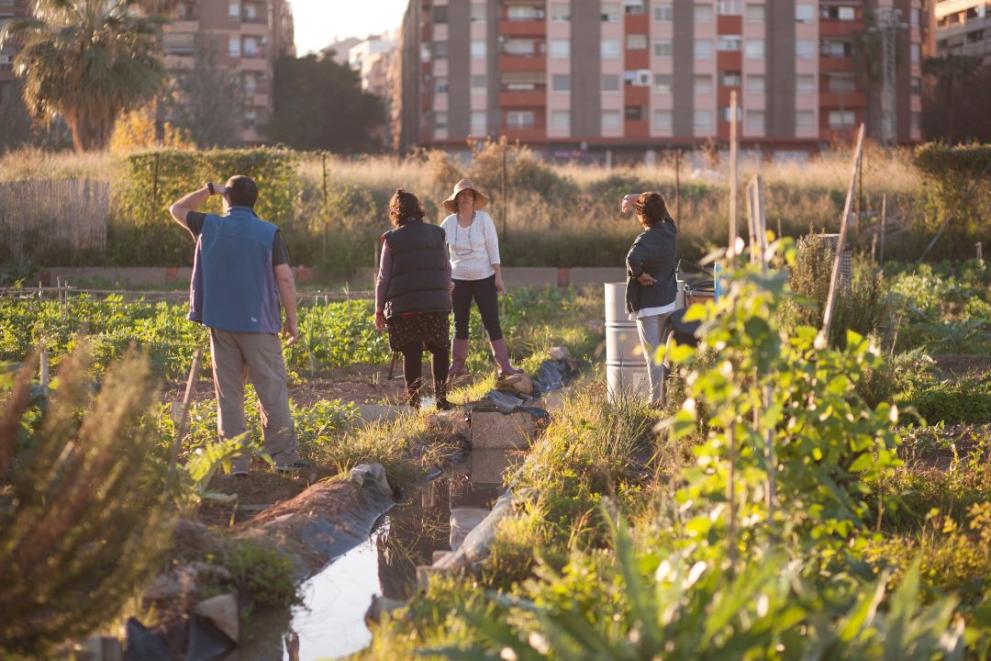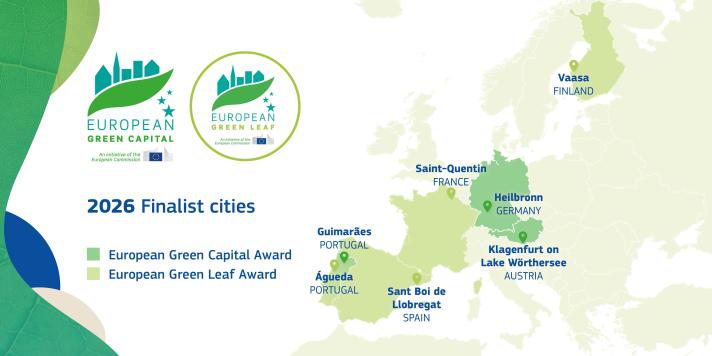
The finalists for the latest European Green Capital & Green Leaf Awards have been chosen, with the seven cities selected based on their accomplishments and ambitions in addressing urban environmental challenges connected to the triple planetary crisis of climate change, pollution, and biodiversity loss.
They are leading by example, combining innovative solutions with strong governance frameworks, aiming for healthy environments for their citizens.
The finalists for the 2026 European Green Capital prize for cities above 100,000 inhabitants are:
- Heilbronn (Germany)
- Guimarães (Portugal)
- Klagenfurt on Lake Wörthersee (Austria)
For smaller cities of 20,000 people, the finalists for the 2026 European Green Leaf prize are:
- Agueda (Portugal)
- Saint-Quentin (France)
- Sant Boi de Llobregat (Spain)
- Vaasa (Finland)
Virginijus Sinkevičius, Commissioner for Environment, Oceans and Fisheries, said:-
“It is encouraging to see cities with ambition and determination to pursue the green transition. It is for the benefit of their citizens, their health and quality of life, but also for businesses and our ecosystems. With the Nature Restoration Law adopted, we now have clear targets for greening cities.
"Today’s finalists are already frontrunning in key environmental areas and can be an inspiration for others to follow.”
The European Green Capital and Green Leaf Awards look at the achievements of Europe’s top sustainable cities in seven environmental areas:
- Air Quality
- Water Management
- Biodiversity, Green Areas, and Sustainable Land Use
- Waste and Circular Economy
- Noise Pollution
- Climate Change Mitigation
- Climate Change Adaptation
Cities’ achievements
Green Capital
Heilbronn has a comprehensive noise pollution monitoring system. The integration of noise management into the ‘Landscape Plan 2030’ and the ‘Mobility Concept’ and the wider citizen involvement demonstrate a holistic approach to urban planning.
Guimarães has been selected for its waste management and circular economy practices prohibiting single-use materials at city events and promoting food waste prevention programs. In addition, it has also improved water efficiency by reducing water consumption in municipal-owned buildings, early leak detection and repair, and creating public water stations.
Klagenfurt on Lake Wörthersee has comprehensive air quality monitoring and plans to further improve air quality by connecting more households to sustainable district heating and investing in sustainable city logistics, including electric cargo bikes.
Green Leaf
Sant Boi de Llobregat integrates nature-based solutions, urban drainage systems and climate change adaptation into the city. The city also has an extensive plastic-free program, which promotes the use of tap water, offering glass bottles and includes a ‘Tips for a Plastic-Free Shopping’ campaign.
Saint-Quentin disposes of waste through a management system with comprehensive coverage, using colour-coded bins for different waste types. To support this, the city introduced innovative measures such as a digital reward system for recycling (‘CLIIINK’).
Agueda has a ‘Climate Action Plan’ with the ambitious target of reducing greenhouse gas emissions by 90% by 2050 compared to 2005. The ‘BeAgueda’ project integrates a shared-use e-bicycle system to improve transport efficiency, reduce CO2 emissions and promote healthy lifestyles.
Vaasa has implemented innovative online systems such as the web app ‘Water Account’ for real-time monitoring of water use by customers. ‘Minimossen’ in the city is Finland's first recycling mall and a shopping place for sustainable consumption.
Next steps
The finalist cities will showcase to a jury panel in October their environmental vision and governance, as well as their communication strategy in case they win.
The winners will be announced in this year’s European Green Capital Valencia (Spain) on 27 November 2024 at a festive award ceremony.
The European Green Capital winner will receive a financial prize of €600,000 to implement their strategy in cooperation with citizens and stakeholders.
The title of European Green Leaf is awarded to one or two cities. Each Green Leaf winner is granted a financial prize of €200,000 to help organise activities during the year when they are holding the title and spark further transformation.
Benefits for cities
Cities are central to environmental protection. They concentrate on innovation and resources, enabling the efficient implementation of sustainable practices and policies that can significantly reduce the environmental footprint of a large proportion of the population. In addition, urban areas, with their economies of scale and engaged citizens, are influential leaders in setting the example for environmental policies.
The cities selected for the shortlist are recognised to be outstanding examples.
In addition, all applicant cities receive valuable feedback from independent experts, and can compare their efforts with other cities, obtaining important information about how to improve their environmental performance.
Winners attract significant attention on a European or even international level throughout their title year, boosting tourism, investment, and cooperation.
But there are lasting benefits even long after their term ends.
Winning cities can change the perspective of citizens on environmental affairs, creating a momentum for ambitious, fundamental urban transformations that will improve cities permanently and attract respective investors. This can in turn inspire others to follow in their footsteps regionally, nationally, or even globally, providing a sense of pride for citizens who actively support the evolution of their hometown.
More information can be found in our online press kit.
Additional information:
Details
- Publication date
- 10 July 2024
- Author
- Directorate-General for Environment


